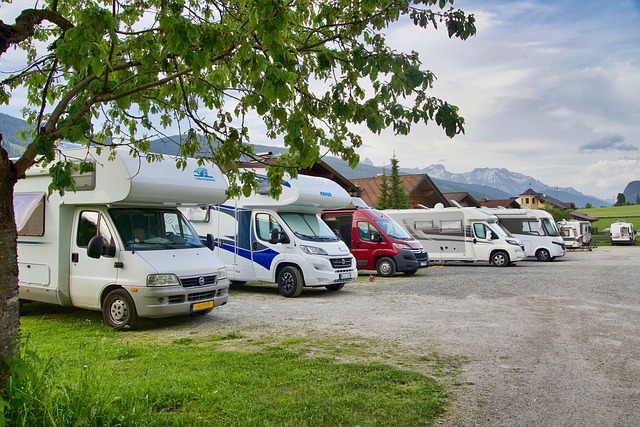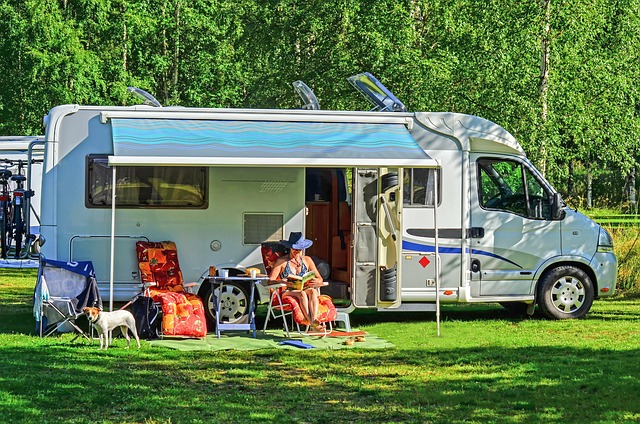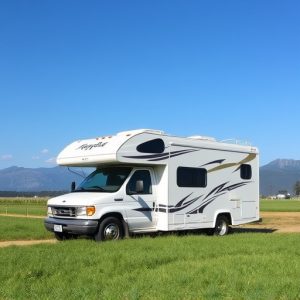Eco-Friendly RV Travel: Green Guide for Sustainable Journeys
To minimize the environmental impact of RV travel and promote sustainable tourism, RVers should ado…….

To minimize the environmental impact of RV travel and promote sustainable tourism, RVers should adopt a range of eco-friendly practices. This includes using energy-efficient appliances within the RV, harnessing solar power for energy needs, and ensuring proper insulation to maintain temperature efficiency. Choosing biodegradable products and responsibly disposing of waste at designated facilities are also crucial steps. Route planning should aim to reduce backtracking and fuel consumption, while carpooling with fellow RVers can further lower emissions. By integrating these practices, RVers can enjoy the outdoors responsibly, with a smaller ecological footprint. Additionally, selecting eco-certified campgrounds, sourcing sustainable provisions, conserving water and electricity, and adhering to local wildlife regulations and cultural heritage site guidelines are among the RV Travel Tips that contribute to preserving our natural and cultural environments for future generations. Embracing these sustainability measures not only enhances the travel experience but also ensures the longevity and integrity of the destinations visited.
Embark on a journey towards greener pastures with our comprehensive guide on eco-friendly practices for sustainable RV travel. This article navigates through essential tips, energy efficiency solutions, and the selection of eco-conscious campgrounds, ensuring your RV adventures minimize environmental impact. From packing an environmentally friendly pantry to respecting wildlife and cultural heritage, we offer actionable RV Travel Tips that promote sustainability on wheels. Join us as we explore how to maintain the beauty of our planet while roaming its vast landscapes in comfort and conscience.
- Embracing Eco-Consciousness: Sustainable RV Travel Tips for Minimizing Your Carbon Footprint
- Energy Efficiency on Wheels: Smart Power Usage and Solar Solutions for RVers
- Green Destinations: Choosing Eco-Friendly Campgrounds and Preserving Natural Habitats
- Sustainable Provisions: How to Pack an Eco-Friendly RV Pantry and Reduce Waste
- Mindful Exploration: Respecting Wildlife and Cultural Heritage While Traveling in Your RV
Embracing Eco-Consciousness: Sustainable RV Travel Tips for Minimizing Your Carbon Footprint

When embarking on RV travel, adopting eco-conscious practices can significantly reduce your environmental impact and contribute to sustainable tourism. To minimize your carbon footprint while exploring the great outdoors in an RV, consider these practical tips. Opt for energy-efficient appliances in your RV to lower electricity consumption. Utilize solar panels to harness renewable energy, reducing reliance on fossil fuels and powering your journey with clean energy. Properly insulate your RV to maintain temperature efficiently, lessening the need for excessive heating or cooling, which conserves both energy and resources.
Choosing eco-friendly products and materials is another key aspect of sustainable RV travel. Select biodegradable cleaning supplies and personal care items to minimize chemical waste. Similarly, when disposing of waste, follow local regulations and use designated dump stations. By practicing responsible waste management, you prevent pollution and protect natural habitats. Additionally, plan your routes to avoid backtracking, which can save fuel and time. Embrace carpooling opportunities with fellow RVers to further reduce emissions. Each of these actions contributes to a collective effort towards sustainable travel, allowing you to enjoy the wonders of the world while being mindful of your ecological footprint.
Energy Efficiency on Wheels: Smart Power Usage and Solar Solutions for RVers

Embarking on sustainable RV travel means adopting energy-efficient practices to minimize environmental impact while enjoying the comforts of home on wheels. Smart power usage is pivotal for eco-friendly RV journeys. RVers can optimize their energy consumption by using energy-star rated appliances, employing battery-saving modes on electronic devices, and adhering to a routine that maximizes daylight hours for activities that don’t require electricity. Additionally, insulating the RV effectively can prevent heat loss in colder climates or excess heat retention in warmer regions, reducing the need for heating and air conditioning.
Incorporating solar solutions is another key aspect of energy efficiency for RVers. Harnessing the power of the sun through solar panels not only reduces reliance on external power sources but also enables RVers to harness clean, renewable energy. The size and type of solar panel setup depend on the RVer’s energy needs and storage capacity; however, even a modest system can make a significant difference. It’s crucial to select the right location for solar panels on the RV to ensure maximum sunlight exposure throughout the day. Furthermore, managing energy consumption in conjunction with solar power usage—such as by charging devices during peak sunlight hours and conserving energy during low light—contributes to a more sustainable RV lifestyle. By implementing these smart power usage tips and integrating solar solutions, RVers can significantly enhance their travel’s environmental footprint, making their journey truly eco-friendly.
Green Destinations: Choosing Eco-Friendly Campgrounds and Preserving Natural Habitats

When embarking on an RV travel adventure, selecting eco-friendly campgrounds is a pivotal step in sustainable travel. These establishments are often designated as green destinations, having implemented practices that prioritize conservation and minimizing environmental impact. By choosing campsites that adhere to environmental standards, RVers contribute to the preservation of natural habitats. These campgrounds typically feature organic waste recycling systems, solar-powered facilities, and water conservation measures. They also often provide educational resources on local ecosystems, encouraging respectful exploration and minimal disturbance to wildlife and plant life. RV travelers can further support these efforts by following leave-no-trace principles, responsibly disposing of waste, and keeping noise levels down, ensuring that the beauty and serenity of these natural spaces are preserved for future generations to enjoy.
Incorporating sustainable practices into your RV travels extends beyond where you stay. It includes mindful navigation through sensitive environments, reducing fuel consumption, and considering the carbon footprint of your journey. RV Travel Tips recommend planning routes to minimize driving time, using energy-efficient appliances, and employing solar power when possible. By making eco-conscious choices on the road, from selecting green destinations to practicing sustainable behaviors within them, RVers can make a significant impact on the conservation of our planet’s precious natural habitats. Embracing these RV Travel Tips not only enriches the experience but also sets a precedent for responsible travel that honors and protects the environments we visit.
Sustainable Provisions: How to Pack an Eco-Friendly RV Pantry and Reduce Waste

Embarking on an RV travel adventure is a journey of discovery, and with a few eco-conscious adjustments to your provisions, it can also be a sustainable sojourn. Crafting an RV pantry that aligns with eco-friendly practices begins before you even pack your vehicle. Opt for products with minimal packaging; choose items in reusable or recyclable containers. Select locally-sourced and organic produce to support local agriculture and reduce the carbon footprint associated with long-distance transportation. Dry goods like grains, legumes, and nuts, which have less packaging than their canned counterparts, are not only pantry staples but also contribute to waste reduction. Reusable storage containers for these items eliminate the need for single-use plastic bags. Additionally, investing in a high-quality water filter or purification system can greatly reduce the reliance on bottled water, further diminishing plastic waste accumulation.
In your RV travel tips arsenal, consider composting as a way to minimize organic waste. Set up a small compost bin for food scraps, which can later be used to enrich the soil at camping sites. Embrace the ‘first in, first out’ principle to use ingredients before they spoil, thus cutting down on leftovers and ensuring nothing goes to waste. Also, plan your meals ahead of time based on the availability of ingredients to avoid over-purchasing. Utilize energy-efficient appliances when possible, and always be mindful of conserving water and electricity. By adopting these sustainable practices in your RV pantry management, you’ll not only reduce waste but also contribute positively to the environment during your travels.
Mindful Exploration: Respecting Wildlife and Cultural Heritage While Traveling in Your RV

When embarking on sustainable RV travel, mindful exploration is paramount to preserving both wildlife and cultural heritage. It’s crucial to research and adhere to local regulations regarding wildlife interactions to minimize disturbance and respect their natural behavior. RVers should maintain a safe distance from animals in their habitats and avoid feeding them, as human food can be harmful. By doing so, you ensure the protection of these creatures for future generations to enjoy.
Similarly, when visiting areas rich in cultural heritage, it’s essential to approach with reverence and understanding. This means following guidelines set forth by local communities and preservation societies. Engage with interpretive centers, take guided tours, and participate in activities that support the stewardship of historical and culturally significant sites. RV Travel Tips suggest using resources like travel apps and visitor maps that provide information on how to be a respectful and responsible traveler. By doing your part to preserve the cultural tapestry of each destination, you enrich not only your journey but also the legacy of the places you visit.
Embarking on an RV journey no longer means leaving sustainability behind. With the right eco-friendly practices, travelers can minimize their carbon footprint and preserve the beauty of our natural landscapes for future explorers. This article has outlined essential RV Travel Tips for energy efficiency, sourcing sustainable provisions, and selecting environmentally conscious campgrounds. By integrating these practices into your travels, you contribute to a greener planet while enjoying the freedom and adventure of RV life. Remember, each eco-conscious choice sets a precedent for sustainable exploration, ensuring that the roads less traveled are there for generations to come.







